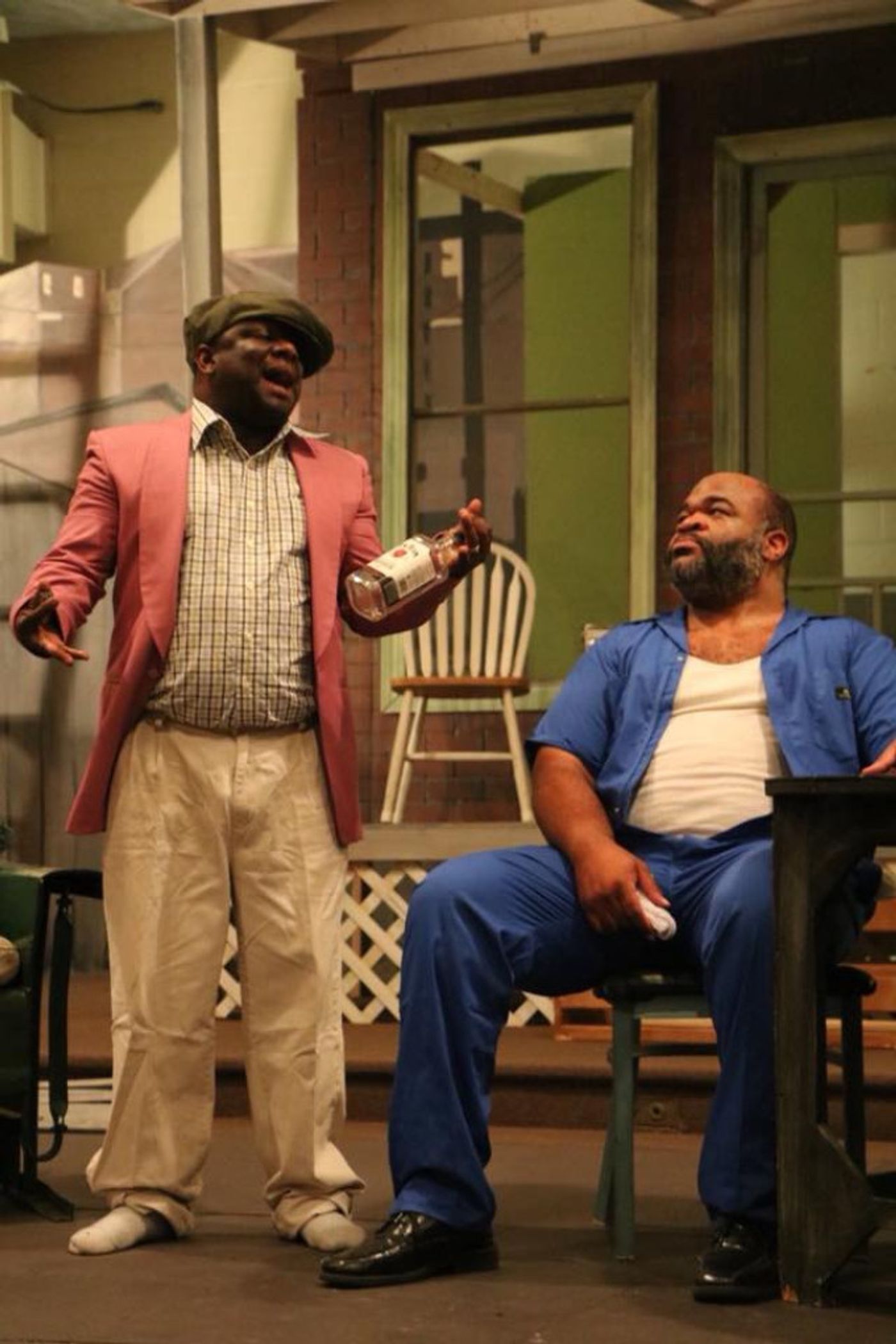Review: FENCES at Faithworks Studios

Sometimes a character stands out from the source material and starts to establish its own reputation. Actors start to circle the part and gauge if and when they might get a crack at it. For men, in straight non-musical plays, Hamlet, Macbeth, Willy Loman, Stanley Kowalski, are a few that have achieved iconic status. Specifically black characters? The list is shorter: Walter Younger in A Raisin in the Sun would be one. There have been other plays and roles of note, but not until you get to August Wilson do you find a greater repository of suitable candidates.
Troy Maxson in Fences is becoming that kind of role. If you are a black male actor over the age of 40, it inevitably comes up on your radar. In this new production from Faithworks Studios, Alphaeus Green, Jr. tackles it and shines as brightly as he ever has.
Originally produced in 1983, Fences is one of the earliest of Wilson's ten-part "Pittsburgh Cycle", although it falls sixth in the chronological sequence. The play won the 1987 Pulitzer Prize for Drama and the 1987 Tony Award for Best Play. James Earl Jones was Troy then, and a 2010 revival starred Denzel Washington, who later produced a film version.
Set in the 1950's, in the Hill District of Pittsburgh (Wilson's primary territory) Maxson is a former baseball player in the Negro Leagues now working as a garbage collector. He is married to Rose (LaShondra Hood) and they have a son, Cory (Isaiah Archie). Troy also has an adult son, Lyons (Antonio "T-Made" Taylor) who reliably visits every payday and a brother, Gabriel (Gary Brice) who is brain damaged from a WWII battlefield injury. His lifelong friend Jim Bono (Sadik Ibn-Mohammad) works with him and their scenes together allow the most insight into Troy's character; the blustery, oversize stories from his past, as well as the confidential exchanges about his attention to other women.
All of Wilson's plays are concerned with themes of African American history and identity, but he is counted as one of the great American Playwrights because his themes are also universal. Fences is an important play about familial conflict: between fathers and sons, and between husbands and wives, two of the overriding themes of American drama in the 20th century.
Kristi Papailler directs with an emphasis on performance and never lets anyone stumble. Gary Brice is enigmatic as the "touched" Gabriel, who moves in and out of the action with a beautifully distracted air that captures what we might assume about someone who has suffered a traumatic brain injury, but also fulfills Wilson's apparent intention that Gabriel, who does indeed carry a trumpet, has also been brought closer to the divine. Antonio "T-Made" Taylor gives Lyons a more obvious huxter persona than I have seen before, but he is long on charm and never sacrifices the integrity of the character. Sadik Ibn-Mohammad seems younger than Jim, who is a contemporary of Troy, but his unforced presence and easy professionalism makes him a good foil for Troy's dominating personality. It is smart work. Channa Banks is pleasant and charming in the small role of Raynell.
One of the young Ms. Banks' most important scenes is with Isaiah Archie as Cory. The character is a potent mix of hope and fury, and Archie finds those two contrasting emotional peaks with assurance, even if he at times seems to push a little harder than required to get there.
If Fences is often thought of as Troy's play, that, unfortunately, overlooks the character of Rose. She is almost as fully drawn as Troy, and the heart of the conflict and resolution of the play rests on her shoulders. LaShondra Hood is technically much younger than this woman of 47 years, but she intelligently explores Rose with a rich understanding of the character's place in Troy's life, this play, Wilson's work, and the history of African American literature.
As for Mr. Green, I know him to also be a smart actor, but his Troy is emotionally charged and full of righteous authority, and you get the sense that Green is connecting with the character on a less academic level than Ms. Hood. When they clash in the second act, that contrast of rationality and emotion helps give this production a fire and fury that provoked some audible call-and-response recognition from the opening night audience. Alphaeus Green, Jr. is FEELING Troy and he will make you feel him as well.
Gerry Kean's set accomplishes a lot on what might have been a small budget, with good use of key elements, such as a vintage metal glider that looks like what used to be in my grandmother's yard, to establish period, and the costumes by Claudette McCracken help pull the characters in to relief against the scenery and stay pretty much within the period.
Producer Rush Trowell has placed this estimable production in a long-neglected venue, the Russell Theatre at 17th & Madison. Unused for some 15 years, the small space boasts a proscenium stage but is lacking in some of the technical niceties, which resulted in some lighting cues being resolved on opening night. But I do love the rediscovery of community spaces that have languished for far too long, and theatre spaces are in short supply west of 9th Street. Mr. Trowell has promised that renovations with the intention of this providing a regular home for Faithworks Studios are in the planning stages, so Watch This Space.
Fences
May 23-27 @ 7:00pm
Faithworks Studios
Russell Theatre
17th & Madison
Louisville, KY 40203
Faithworks-Studios.com
!
Reader Reviews
Videos

